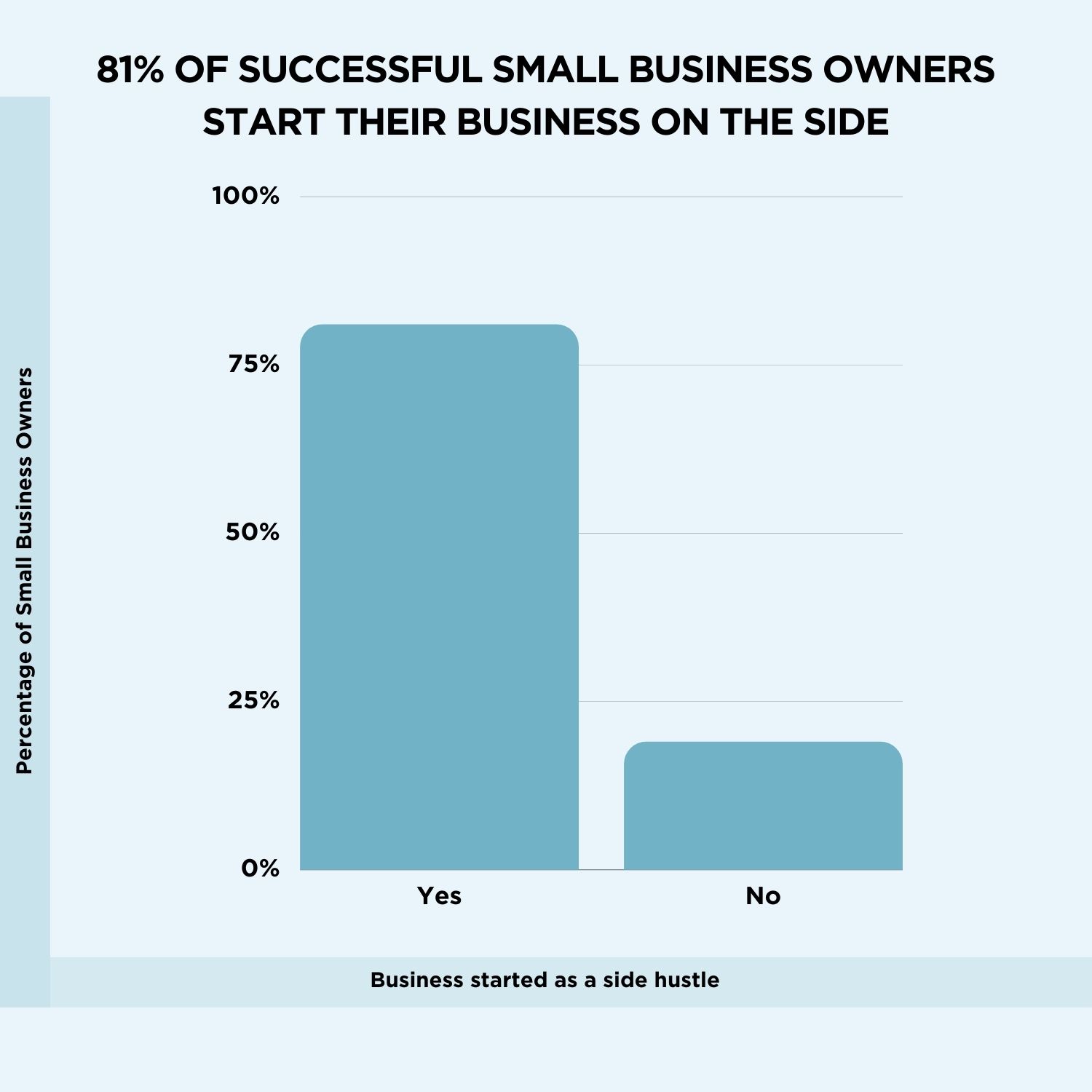We analyzed case studies of 200 successful small business owners who earn 6-figures to 7-figures or more to answer the question:
What does it take to build a successful small business?
In this report, you’ll learn:
- How many small business owners start their businesses as side hustles
- The biggest motivations that lead people to start their own businesses
- How many small business owners have a college degree
- How many small business owners take business loans
- And so much more
Read on to learn what we discovered about small businesses that succeed.
Highlights and key statistics:
- While entrepreneurship is often portrayed as “rags-to-riches,” successful small business owners typically start their businesses on the side and build up a safety cushion before quitting their day jobs. 81% say they started their businesses as side hustles while working a 9-5, studying, working on a different business, or caring for children.
- Small business owners say that the biggest reason for their success is a great customer experience. This is followed by focusing on what customers want and, on the third place, being consistent, persistent, and resilient.
- The biggest motivation for business owners to build a business is to have a bigger impact and feel more fulfilled. 33.3% of entrepreneurs mentioned this as their #1 reason for starting a business. The second most popular motivator (25%) is to have more freedom and flexibility.
- Entrepreneurs who make it to the top 10% of the highest-earning people are highly educated. 90.5% of the analyzed entrepreneurs have a college degree.
- 4% of small business owners say that they have taken a business loan. Most of their funding (if any) seems to come from personal savings.
- 34% say they have started another business before their current business. While it can be beneficial to have experience from running a business, it doesn’t seem to be a must.
- Successful entrepreneurs are typically depicted as young and hustling college graduates. But in reality, people seem to start thriving small businesses later in life. Out of the analyzed entrepreneurs, 51.3% are between 30-39 years old. 26% are between 20-29 and 14.6% are between 40-49.
- Success doesn’t have to take years. 46.3% of the analyzed entrepreneurs started their businesses in the last five years. 41.5% founded their businesses in the last 10 years.
- Successful small businesses don’t accept a lot of funding from investors. Only 0.5% of businesses say that they have accepted external funding.
- The most popular marketing channel for entrepreneurs is social media, followed by marketplace platforms such as Fiverr, Craigslist, Etsy, and Upwork. The third most popular marketing channel is referrals, word of mouth, and using their existing network.
81% of successful small business owners start their businesses as side hustles
Entrepreneurship is often portrayed as “rags-to-riches” stories. But on the contrary, it seems that thriving entrepreneurs tend to be risk-averse.
81% of 5-, 6- and 7-figure small business owners start their businesses as side businesses while working a 9-5, taking care of children, going to college, or building a different business.
Side businesses have several benefits. They come with lower risk and entrepreneurs can use their salaries to invest in their venture and grow it even faster.
The biggest success factor is to focus on what the customer wants
The median income for self-employed people at their own incorporated businesses was $51,419 in 2017. For self-employed with their own unincorporated firms, the figure was $25,240. At the same time, the small business owners in this analysis make far more than most entrepreneurs. So, what is the “secret” to a successful business?
We compared all the reasons entrepreneurs mentioned for their success (57 categories). The biggest reason, when all factors are compared, is that they deliver a great customer experience or focus on building relationships with their customers..
Focusing on what customers want and understanding their needs are the second most widely mentioned success factors. The third success factor is to be persistent, consistent, or resilient.
Other success factors are:
- Having the right type of mindset
- Networking and building relationships
- Doing something you’re passionate about
- Not quitting your day job
- Taking action
- Finding a niche
- Asking for help/hiring team members/hiring a coach or mentor
- Putting in work
- Using the right pricing
- Planning your business
- Being confident
There isn’t any “key” that will unlock business success. But these factors have helped others build their businesses to six figures and up.
The biggest motivation for starting a business is to have a bigger impact and feel more fulfilled
Starting a business requires drive and motivation. So, what are the biggest reasons for entrepreneurs to start their companies?
33.3% of small business owners say that they started their businesses to have a bigger impact and/or feel more fulfilled.
25% say that they wanted more freedom and flexibility in their lives. For example, they wanted to travel more or spend more time with their families.
14.4% wanted to earn more money, for example so that they would be able to cover unexpected costs or to finance their studies. 13.3% are motivated by solving a problem.
7% started their businesses because they had lost or quit their jobs. 3.3% got started through a hobby and 3.3% didn’t mention their motivation to start their business.
The strongest motivator seems to be internal fulfillment. In the process, many of these entrepreneurs also end up finding financial freedom.
90.5% of small business owners have a college degree
According to a CNBC survey, 20% of small businesses are founded by people with only a high school diploma. 26% are started by college-educated entrepreneurs.
At the same time, 90.5% of the analyzed entrepreneurs have a college degree. The rest (9.5%) either never went to college or dropped out.
Those who have a college degree tend to earn more as employees. According to the US Bureau of Labour Statistics, they earn roughly $30,000 more than those who have only completed a high school diploma. The same seems to apply to entrepreneurs.
A small minority of entrepreneurs (4%) take business loans
How many small businesses take loans to start their businesses?
4% of small business owners in this report say that they have taken a business loan. A whopping 96% haven’t taken loans.
Why? One reason could be that small businesses are much cheaper to start than other types of businesses (such as restaurants and brick-and-mortar stores), so this type of business doesn’t even require that much funding.
A third of successful entrepreneurs have started a business before
How many small business owners that make close to 6-figures or more have started a business in the past?
34% of successful small business owners say that they have started a business before their current one.
Building a business can be a great way to launch other ventures in the future. But while experience seems to be an advantage, it’s not a must for building a booming small business.
The typical age range for successful entrepreneurs is 30-39
Entrepreneurs are often portrayed as young college drop-outs. But the average age of successful startup founders is, in fact, 45 (HBR). Similarly, small business owners seem to start their businesses later in life.
51.3% of entrepreneurs in this study are between 30-39 years old. 26% are 20-29 and 14.6% are 40-49. 3.5% are between 15-19 and another 3.5% are 50-59. 1% are 60+ years old.
In other words, 30-39-year olds are overrepresented here. The reasons could be many, such as more funds to invest in a business, more work experience, and a bigger network.
The most successful small businesses were launched in the last 5 years
How long does it take to build a business? Few businesses are overnight successes, but it also seems that small businesses can grow relatively fast.
Out of the analyzed businesses, 46.3% were started in the past five years (between 2016-2021). 41.5% were founded between 2010-2015, 8% between 2004-2009, 2.4% between 1998-2003, and 2% before 1997 (in which case they tend to have been offline businesses that later moved online).
Growing a small business can be a fast process. Many of the highest-earning businesses with a revenue of multiple 7-figures were founded in the past 5-10 years.
99.5% of entrepreneurs don’t take any external funding
Startups that receive millions in funding tend to get a lot of buzz. At the same time, that same need for funding isn’t there for small business owners.
Only 0.5% say they have taken external funding.
Small business owners, although some of them have a valuation of millions of dollars, tend to prefer to use their own or loaned money to grow their businesses rather than pitch investors.
Social media is the most popular marketing channel
What are the most popular marketing channels when entrepreneurs start their businesses? We compared all the marketing channels that were mentioned as top strategies. According to this comparison, the most popular channel is social media (mentioned in 28.4% of the case studies), including platforms like YouTube, Instagram, Facebook, TikTok, Reddit, and Pinterest.
The second most popular marketing channel is marketplace platforms, like Upwork, Fiverr, Etsy, Poshmark, Craigslist, and Groupon (18%).
Other marketing channels are:
- Referrals, word of mouth, and networking (14.4%)
- Blogging and podcasting (10%)
- Events (5%)
- Outreach (5%)
- PR (4%)
- Email (4%)
- Other (such as affiliate marketing or influencer marketing) (2%)
9.6% didn’t mention their top marketing channels.
As businesses grow, email marketing grows in popularity and comes in third place. At this point, businesses tend to have built up their own audience and email marketing becomes a high-ROI marketing channel.
Conclusion
I hope this report helped you get valuable insights about small businesses that succeed.
If you’d like to learn more about our analysis, here’s a PDF that details our process.
Now, I’d like to hear from you:
What’s your #1 takeaway from this research?
Let me know in the comments below!




